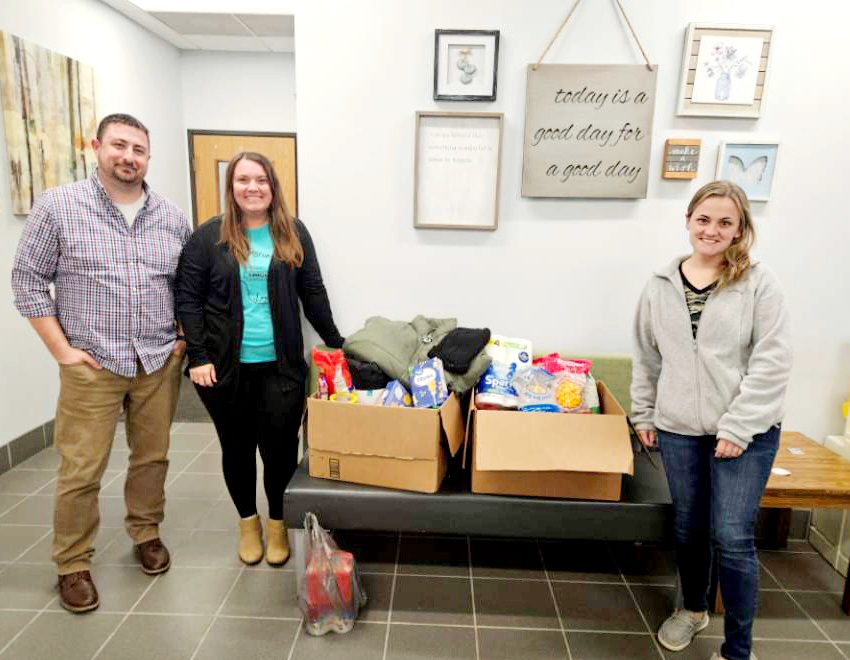
Thank You TRICOR Insurance Lancaster for Supporting our Community Closet with Your Donation!



Friendships are important to children. If your kid is having a hard time fitting in, there are ways you can help your child make friends.
https://childmind.org/article/kids-who-need-a-little-help-to-make-friends/


Snow days can offer a unique opportunity to prioritize mental health and well-being. Here are some ways people can use snow days to benefit their mental health:
Remember, the key is to tailor your snow day activities to what brings you joy and relaxation. Everyone is different, so choose activities that resonate with you and contribute to your overall well-being.

Tired of the New Year’s Resolution game that doesn’t work? Want lasting change when it comes to alcohol and substance use? Reach out today! We can help!
Looking for mental health and substance use awareness training for your organization’s leadership team? We can help!

If you’re dealing with loss this holiday season, please read the article below by Kristen Carpenter, PhD. The link to the full article is below.
“If this is your first holiday season after the death of a loved one, you might be grappling with whether you should carry on traditions while grieving. And guess what? It’s perfectly normal and important to give yourself some grace.
Let yourself feel the way you feel
Feelings are facts. Everyone copes with loss in their own way. Your emotional responses to loss are valid and are part of your unique healing process. Don’t waste energy on feeling ashamed or guilty about your feelings; invest that energy in making concrete efforts to feel better and heal.
Be open to adjusting your holiday traditions
The first holiday after the passing of a loved one is often the hardest, especially if the loss is unexpected.
When a loved one is lost, some families find comfort in the familiar and incorporate a time of remembrance into their holiday celebrations.
Others find the usual traditions too painful, especially if the loss occurred recently. If this is the case, it can be helpful to celebrate the holiday in an entirely different way and consider resuming traditions when you’re ready. You might find it helpful to change the location of a celebration and consider taking a trip or visiting a family member in a different city.
Some prefer to be alone in their grief, and that’s okay too. Simply explain your need to your family and friends, who’ll likely care and understand.
Incorporate a time of remembrance into your holidays
How you celebrate the life of someone who died is unique to you, depending on what the person meant to you and how you feel comfortable commemorating your relationship.
Here are a few ideas:
Have those gathered together share a story or memory of the person.
Light a candle.
Plant a flower or tree.
Visit the person’s grave.
Say special prayers.
Keep photos close; for instance, wear a photo of the person in a locket or keep a picture with you during a special event you wish the person could have attended, such as a religious ceremony or wedding.
Don’t hesitate to seek support from others and don’t be afraid to accept help. Here are some easy ways to make sure your family and friends can help in the most meaningful ways.
Lead the way in letting people know what you need
Be clear about whether you prefer to grieve privately, with the support of close friends or with a wide circle of people accessible through social networks.
Tip for friends: Don’t take to social media to offer support, particularly if someone who’s experienced loss isn’t communicating publicly online. This could lead to you sharing something personal that the person prefers not to share.
Ask a friend to set up a meal train
People love to bring food, but nobody needs three lasagnas on the same day. Online tools make meals easy to coordinate, so this doesn’t happen.
Don’t be afraid to ask for food you can freeze — this can be especially helpful for a parent who’s handling the death of a spouse while raising children.
Write down what you need (the “notecard method”)
The “notecard method” will save you from trying to think of something in the moment and make your life easier when asked by a supportive friend, “What do you need?” or “How can I help?”
Here’s how it works:
Sit down and make a list of what you need, including things for tangible and emotional support. Things like:
Holiday or grocery shopping
Food preparation
Wrapping gifts
Household chores, like cleaning, mowing or maintenance
Get a stack of notecards and write down one item on each card.
When people ask how they can help, hand them a note card or have them choose something they feel they can do.
There isn’t one right way to deal with grief during the holidays
Everyone copes differently and you’ll find ways that are easier or more helpful for you than others. Allow yourself to feel the emotions, listen to yourself during this time and seek help if you need it. Taking care of yourself, sharing memories and being surrounded by supportive people are a few great ways to get through this time, but you’ll have to decide which methods work best for you.
Source: https://health.osu.edu/…/ment…/grief-during-the-holidays

Here’s an article by Adriana Morga that may help! See the source link below for more information!
The holidays are supposed to be a joyful time, but they can also be financially stressful. With gifts, social gatherings and plane tickets home, the costs can start piling up.
Compared to the height of the pandemic, “we’re having less stress navigating the things that bring us together during the holidays. What is different from last year is how much financial stress there is,” said Dr. Rebecca Brendel, director of the American Psychiatric Association.
Here are recommendations from experts to reduce financial stress during the holidays:
In many families, the holidays mean going all out with gift giving. But this can quickly become stressful if your finances make it hard to keep up.
Managing expectations is key, according to Sarah Foster, a Bankrate.com analyst.
“During the holiday season, we often feel like not talking about money, not letting individuals know how much the gift we bought for them cost,” said Foster, who recommends leaving aside taboos and talking about how much you can afford to give this year.
For Kathy Colmenares, a Connecticut-based senior caregiver and singer who experienced financial challenges during the pandemic, setting expectations meant choosing to cut down on the amount of money she sends to her family and friends in Venezuela.
“I used to not care if I had no money as long as I could send money to help,” she said. “I have to put myself and my family first.”
Setting a budget can help prevent stress during the holidays, Brendel said.
“Making decisions and sticking to them can really avoid regret and stress after the spending happens, when the January bills start coming in,” she said.
She recommends prioritizing who gets individual gifts and organizing a gift game such as white elephant or gift pool with the rest of your loved ones. Alternatively, if you are planning to give individual gifts, she recommends allowing your family members to say which things they’d really like, since it takes the pressure and stress off of you.
There are several alternatives to spending a lot of money. They include:
— Homemade gifts
One of Brendel’s favorite homemade gifts is cocktail mason jars. You put the ingredients for a cocktail in a mason jar and the recipient just has to add water or alcohol.
This year, Lena Liu, 29, a Massachusetts-based resident physician, will give homemade bracelets to some of her friends.
“It can be really thoughtful and it actually ends up not being so expensive either,” Liu said. “They know that you put your work and your energy into designing the bracelet and getting the beads so they really appreciate that.”
— Gift cards
Gift cards can seem impersonal, but Foster argues that they are a great way to stay within your budget since you can plan out the exact amount you’re spending on each card.
— Experiences
When patients approach Karen Lynn Cassiday, managing director of the Anxiety Treatment Center of Greater Chicago, about their financial stress during the holidays, the first advice she gives is to grant experiences rather than items.
“The thing that each person most deeply needs is to be known, heard and seen,” Cassiday said. “Then doing something with them or something for them is priceless.”
You could also gift a photoshoot or framed pictures or digital albums to commemorate happy experiences.
— The gift of time
If you can’t afford to take your parents on a trip or visit them during the holidays, giving them more of your time can be a true gift, according to Eliza Menninger, medical director of the Behavioral Health Partial Hospital Program at McLean Hospital in Massachusetts.
Whether it’s planning weekly video calls with your friend group or calling your grandma every day, Menninger suggests you think of non-monetary gifts that your loved ones will appreciate.
Expectations or traditions you grew up with, such as buying expensive gifts for every member of your extended family, can cause stress during the holidays. Creating your own new traditions can help reduce it.
This year, Valentina Chavez Otero, a 22-year-old resident of Norwalk, Connecticut, is planning to celebrate the holidays by spending a day in New York City.
“I’m not very interested in celebrating Christmas, I just want to spend a day walking and seeing new things,” said Chavez Otero, who has faced economic instability since moving from Cali, Colombia, with her boyfriend.
With inflation making holiday food even more expensive than usual, one way to cut costs is making sure whoever is hosting doesn’t have to pay for the whole meal.
If your parents, grandparents, aunts or friends are hosting in their house, you could propose that everyone brings a dish, Brendel said.
“Potlucks can always be fun, and they take away the stress of preparation from one person and also reduce the cost from falling on the host,” she said. “These kinds of ideas can really reduce financial burden and stress.”
If you are having financial difficulties, it can help to talk about it with your family and friends, Brendel said.
Liu, who was diagnosed with anxiety and depression during her first year as a medical resident, now feels more comfortable talking with her family after keeping her struggles to herself for six months.
“I’m of Chinese ethnicity and, in our culture, it’s very stigmatized to talk about mental health at all,” Liu said.
Her parents and twin sister helped her through the difficult time, and her father shared that he struggled to show emotions when he was growing up and wants her generation to be able to be more open.
While your stress might stem from financial struggles, negative feelings can spill over to other aspects of your life, making it hard to enjoy the holidays.
Menninger recommends taking some time out from social gatherings and Christmas shopping to do something for yourself, such as exercising or meditating.
If you tend to forget to take a second to breathe, Menninger recommends you add an alarm in your phone as a reminder. The best times to have some time alone are between 4 p.m. and 6 p.m., she said.
For Lori Lebson, a 41-year-old mom from Massachusetts, it’s crucial to go for a run at some time during the day, even if it means waking up a bit before her children.
Chavez Otero, who has been having trouble sleeping for the last few months, watches sleeping meditations on YouTube to help her reduce anxiety. Liu’s favorite relaxing activity is doing yoga before or after a hospital shift.
Liu also practices journaling, writing down what she is grateful for in her life.
Getting enough sleep is also critical, so Menninger recommends turning off your electronics a few hours before bed.
Author Unknown


Thank you Lisa Judith Ibarra, Paula Stauffacher, Kim Klinger, Becky Clayton, Jolene Kingeter, and Vicki Bergman for your non-perishable food donation to ensure community members in Iowa and Grant Counties have something to eat during the holidays! We are grateful beyond words!

We, at Unified Community Services, are so grateful to partner with Nicole Steinbach of Rural Mutual Insurance this holiday season! Nicole advised that Rural Mutual Insurance offices in Fennimore and Dodgeville have decided to adopt Unified Community Services’ Community Closet that serves Iowa and Grant Counties.
Rural Mutual is asking for unexpired, nonperishable food, clothing, hygiene items, or monetary donations on behalf of the Community Closet. Donations can be dropped off at Rural Mutual offices to support this cause that provides these donations to people in the community in need for FREE. They’re accepting donations until December 20 at the following locations:
1196 Lincoln Ave A, Fennimore, WI 53809
401 N Union St, Dodgeville, WI 53533
With deep gratitude, thank you!